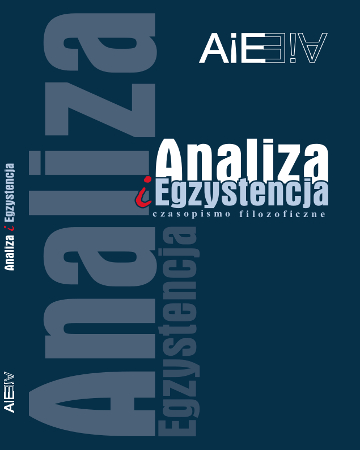
ISSN: 1734-9923
eISSN: 2300-7621
OAI
DOI: 10.18276/aie.2015.31-06






Issue archive /
31 (2015)
Śmierć Boga, śmiech człowieka
(The death of god and laughter of Man)
| Authors: |
Marcin
Smerda
Uniwersytet Pedagogiczny w Krakowie |
| Keywords: | Michel Foucault, Georges Bataille, Friedrich Nietzsche, the death of man, the death of God, laughter, creativity |
| Data publikacji całości: | 2015 |
| Page range: | 17 (117-133) |
Abstract
Author of the article starts with a question about the meaning of the activity that is writing. He looks for answers in ‘The Order of Things: An Archaeology of the Human Sciences’ by Michel Foucault, which – according to the author – emerged from the experience of the laughter, triggered by the book of Jorge Louis Borges, in which he included an excerpt from the Chinese encyclopedia describing the classification of animals. The author is analyzing this phenomenon in detail, inter alia in the context of what about the laughter thought Georges Bataille, who greatly inspired Foucault. However, the author does not end his deliberation with an answer to the question: ‘Why Foucault wrote ‘The Order of Things’’, where the philosopher announced ‘the death of man’ for the first time. He is trying to go deeper and answer the question: ‘why the man had to die?’
Download file
Article file
Bibliography
| 1. | Bataille G. (1982), Georges Bataille we własnej osobie, [w:] M. Janion, Z. Maj- chrowski (red.), Odmieńcy, Gdańsk: Wydawnictwo Morskie. |
| 2. | Bataille G. (1985), O Nietzschem, przeł. T. Komendant, „Literatura na Świecie” nr 10, s. 165–210. |
| 3. | Bataille G. (1998), Doświadczenie wewnętrzne, przeł. O. Hedemann, Warszawa: KR. Bataille G. (2007), Erotyzm, przeł. M. Ochab, Gdańsk: słowo/obraz terytoria. Bataille G. (2009), Łzy Erosa, przeł. T. Swoboda, Gdańsk: słowo/obraz terytoria. |
| 4. | Benjamin W. (1996), O pojęciu historii, przeł. K. Krzemieniowa, [w:] tenże, Anioł historii. Eseje, szkice, fragmenty, red. H. Orłowski, Poznań: Wydawnictwo Poznańskie, s. 413–425. |
| 5. | Brassaï (2001), Rozmowy z Picassem, przeł. Z. Florczak, Kraków: Wydawnictwo Dęby Rogalińskie. |
| 6. | Brook T., Bourgon J., Blue G. (2008), Historia chińskich tortur, przeł. I. Stąpor, Warszawa: Bellona. |
| 7. | Broyard A. (2010), Upojony chorobą. Zapiski o życiu i śmierci, Wołowiec: Czarne. |
| 8. | Eribon D. (2005), Michel Foucault. Biogra a, przeł. J. Levin, Warszawa: KR. |
| 9. | Foucault M. (2006), Słowa i rzeczy. Archeologia nauk humanistycznych, tłum. T. Komendant, Gdańsk: słowo/obraz terytoria. |
| 10. | Kant I. (2009), Krytyka czystego rozumu, przeł. P. Chmielowski, Warszawa: Wy- dawnictwo Hachette. |
| 11. | Matuszewski K. (2006), Georges Bataille – inwokacje zatraty, Łódź: Wydawnictwo Uniwersytetu Łódzkiego. |
| 12. | Nietzsche F. (2008), Radosna wiedza, przeł. M. Łukasiewicz, Gdańsk: słowo/obraz terytoria. |
| 13. | Nietzsche F. (2010), Tako rzecze Zaratustra, przeł. W. Berent, Kraków: vis-à-vis/ Etiuda. |
| 14. | Platon (2012), Uczta, przeł. A. Sera n, Warszawa: Wydawnictwo Sic! |
| 15. | Rudziński R. (1978), Jaspers, Warszawa: Wiedza Powszechna. |
| 16. | Swoboda T. (2010), Historie oka. Bataille, Leiris, Artaud, Blanchot, Gdańsk: słowo/ obraz terytoria. |